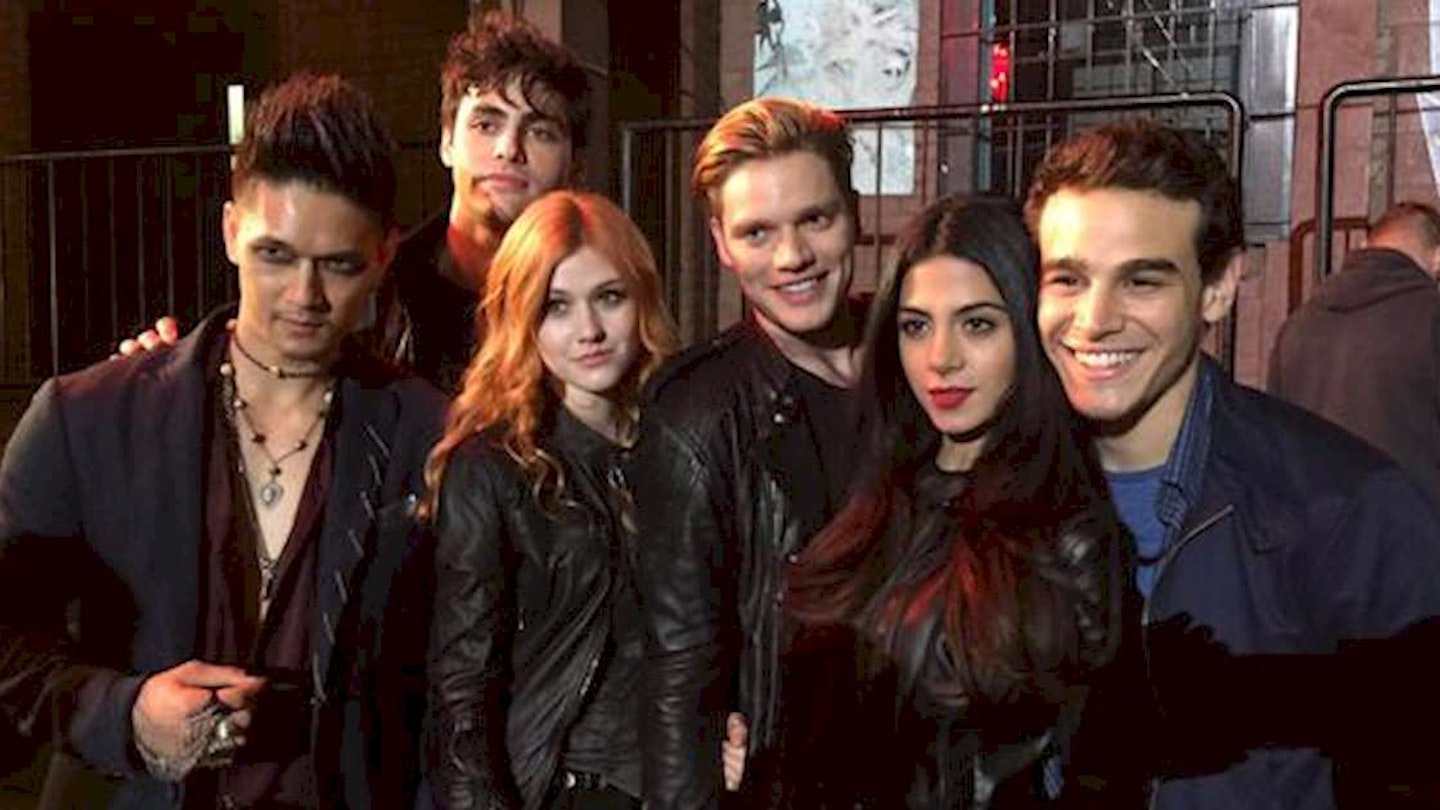From its debut earlier this season, the Shadowhunters TV series has worked its magic, ensnaring large audiences and consistently building its fervent fan following. Not really surprising considering that it's based on Cassandra Clare's best-selling (36 million copies in print) The Mortal Instruments books, the latest spin-off of which, Lady Midnight, was recently published. And even with a failed big screen adaptation in the form of 2013's The Mortal Instruments: City Of Bones in the mix, the franchise continues to grow in popularity - a point exemplified by the fact that the show has officially been renewed for a second season.
"Listen, I think you have the marriage of the two most important components in being successful," offers executive producer/director McG. "One is archetypal story. I mean, come on, it's the Skywalker story. It's Peter Parker. It's everything I love. That's what you're doing and that's what Cassie is doing such a great job bringing to life. You know, you think that you're regular, and then the hand of fate touches you and you realize you have a higher calling and you're so much more than you thought. It's scary, but you pull yourself up by your bootstraps and you make it happen. That's just my favorite story to tell, so that's bean one. Bean two is to do that with original voicing so that it doesn't feel played out and boring. Those are the two elements that I find most exciting, and that's what Cassie's brought. That's what we do our best to bring to life."
In Shadowhunters, Clary Fray discovers on her birthday that she is not who she thinks she is, but instead is the latest in a long line of "Shadowhunters", human-angel hybrids whose purpose is to hunt down demons. Following her mother's kidnapping, Clary finds herself immersed in this world of demon hunting, relying on Shadowhunters Jace, Isabelle and Alec, who are there to help guide her on her journey to her true destiny. With her best friend, Simon, Clary finds a new life among vampires, faeries, werewolves and warlocks as she tries to find her mother. But as she quickly discerns, nothing is as it seems, including close family friend Luke, who knows more than he is letting on; as well as the enigmatic warlock Magnus Bane, who could hold the key to unlocking Clary's past.
Karey Burke (executive vice president programming and development, Freeform network): We were looking to branch into this genre. In our movie packages we air Twilight and The Hunger Games and Harry Potter, and we do very well with big saga programming. The feeling was we should do our own, so we should develop a series based on the interest our audience has in this subject matter. We were developing some ideas not based on previous material, but this seemed to us to be kind of like the golden goose. It's hard to find something that is so pre-sold and beloved and has the bones of years of storytelling.
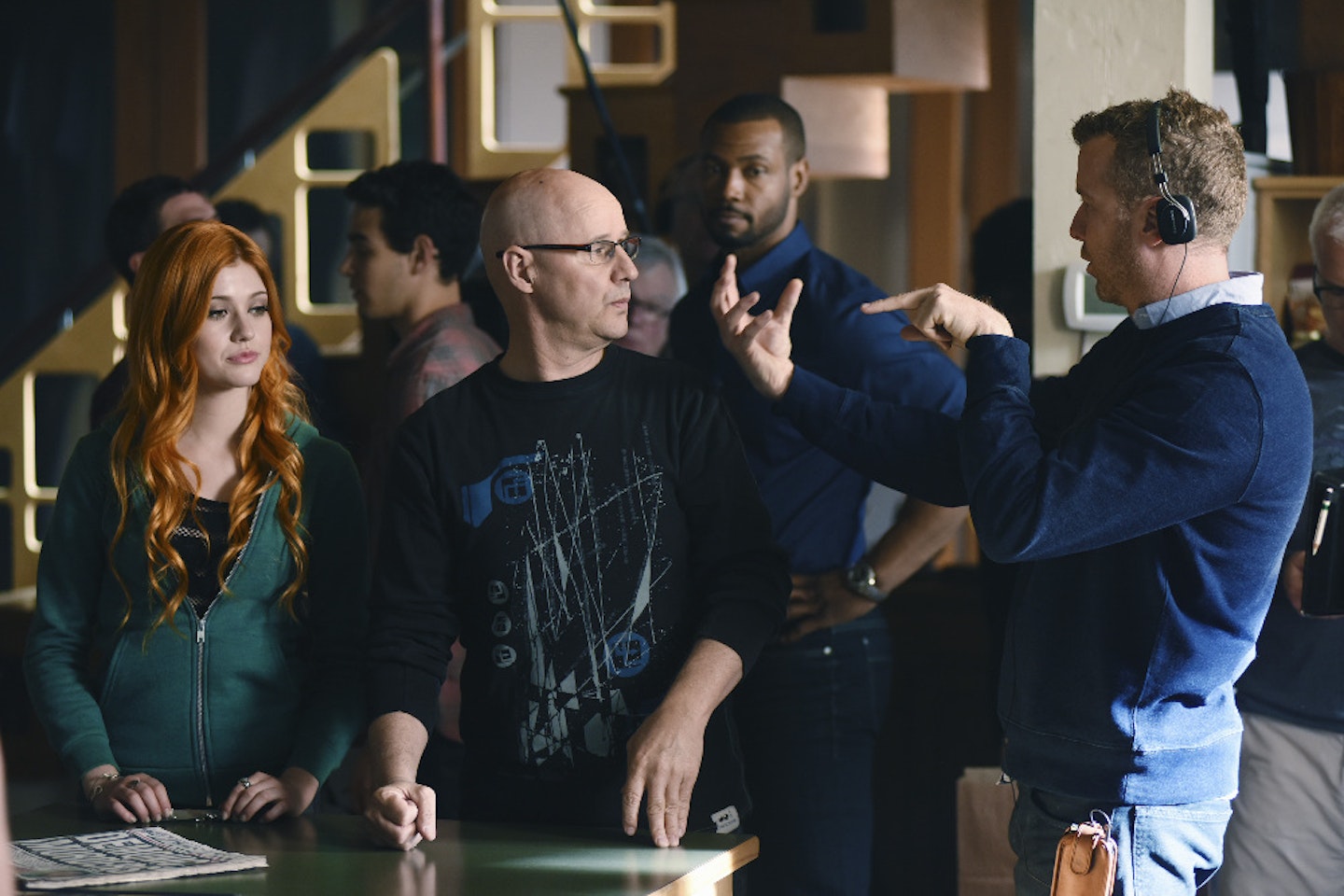
Ed Decter (executive producer/showrunner): I have an 18-year-old daughter, so she and her friends of course knew the novels before I did. When I got contacted by an executive from Constantin [Film Produktion], I read the first book right away and went in to take the meeting. I am also a YA author; I'd written six books for Simon and Schuster, so it's a passion of mine. The whole genre is. So I came in and showed them my six books, saying this is something I could really get passionate about, both as a writer and a parent. What I hooked into the book was a little bit different than some other people. I hooked into unique aspects, among them a Jewish vampire, a relationship between a warlock and a Shadowhunter that may not be accepted by other people within their world; and then I hooked into the idea that a mother would protect a child so much that she would try to hide this world from her. Those things I felt were super unique in the novel.
Burke: We had been tracking the book series and what was happening with it, and whether or not there was going to be a second movie. Then we were told we were going to get a shot at The Mortal Instruments as a series. I knew the books from my teenagers and I knew Ed Decter from many years of working on TV shows together, so I was excited that it was him and he was going to be adapting the books. They came and pitched us and left the script behind for the pilot, which we loved, and they had a very fully thought out visual presentation of what the show would look like, down to the imagery and special effects and tone. There were other networks that wanted the show, so there was a bidding war, but we got it.
Decter: Constantin shopped the books around after the movie version, but they didn't have a lot of takers because of it. But the knowledge of the property was increased by the movie, so that helped us in a way in terms of that increased awareness. The fact that it advertised what a big best-selling series this was helped us a lot. So the movie hindered us in some ways but helped us in others. I think Cassandra would be the first one to tell you that they sold a lot of books because the movie was made, so it ended up all positive.
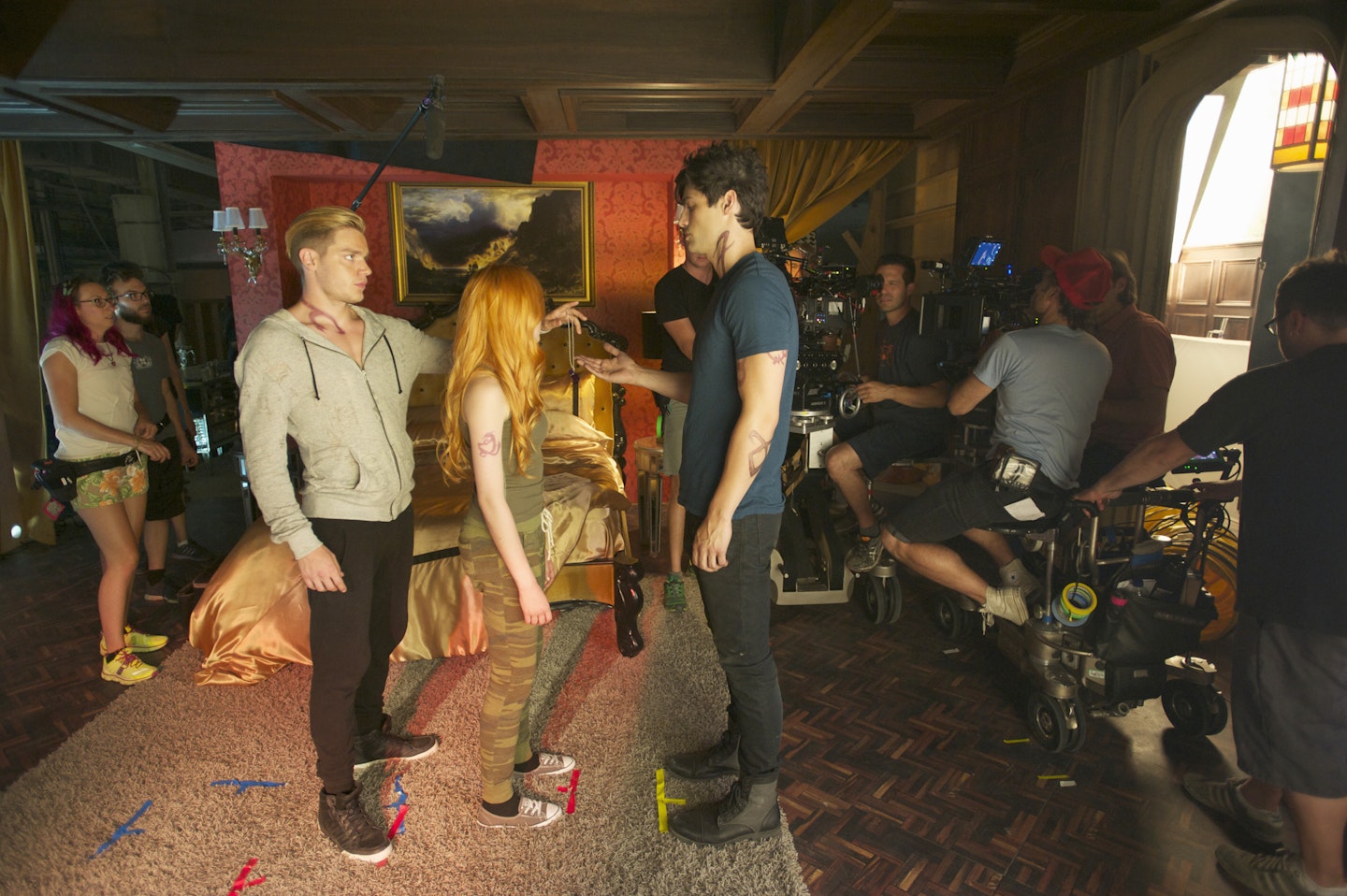
Burke: The Mortal Instruments seemed perfect for television. The movie gave us a moment's pause, but I think after the meetings it was obvious that Constantin was very clear-eyed about lessons learned and things they thought they hadn't done as well as they could have. So it was actually almost a benefit that they had made the movie, because they knew where the landmines were in the material and they didn't want to step on them again. We felt like we reaped the benefit of them having learned those lessons, and it's really a testament to the underlying appeal of the material and the book series that it could recover from a movie that didn't do that well.
Michael Reisz (executive producer): What TV is able to do, as opposed to a feature film, is explore all the nuances that might not have the time to be explored within two hours. What we really sought to do was take the richness of the world that Cassandra created and see how we can, hopefully, do this in many seasons of a TV series, where we have full hours at a time to explore the very specific relationships, very specific adventures, and the evolution of the characters. So it allowed us to go into greater detail and really explore the things that the fans absolutely love about the series, and create new surprises that fans of the books can come in fresh and be excited about. We looked at the TV series as our own kind of unit and just ran with it.
Decter: Once we got the green light, I read all the novels and did an unbelievable amount of research on what were the high points, what we were trying to get to, what absolutely had to be kept and everything like that. But no matter what book you're adapting – it doesn't matter if it's a famous book or not – you have to decide what you can and can't include. For instance, the novels stay very close to Clary's point of view and on a TV show, just by the fact that you have all of these characters and storylines, you have to shift the focus to other people as well. These books have got a lot of moving parts and are so famous that we had to build in some surprise for even the diehard fans. We're hoping they're going to say, "Wait a minute, that wasn't in the book!" and then we're hoping a few episodes later they'll say, "Oh, I see what they did. They got to this part that I really loved, but they did it in a whole new way." So it's challenging, but the fans and the excitement about the books is what makes the show so popular and worthwhile; they're the ones that are talking about it and really going back and forth online. We knew there was going to be some dispute with some of the things we're doing and we think we're winning more battles than we're losing. It was actually more exciting than nerve-wracking.
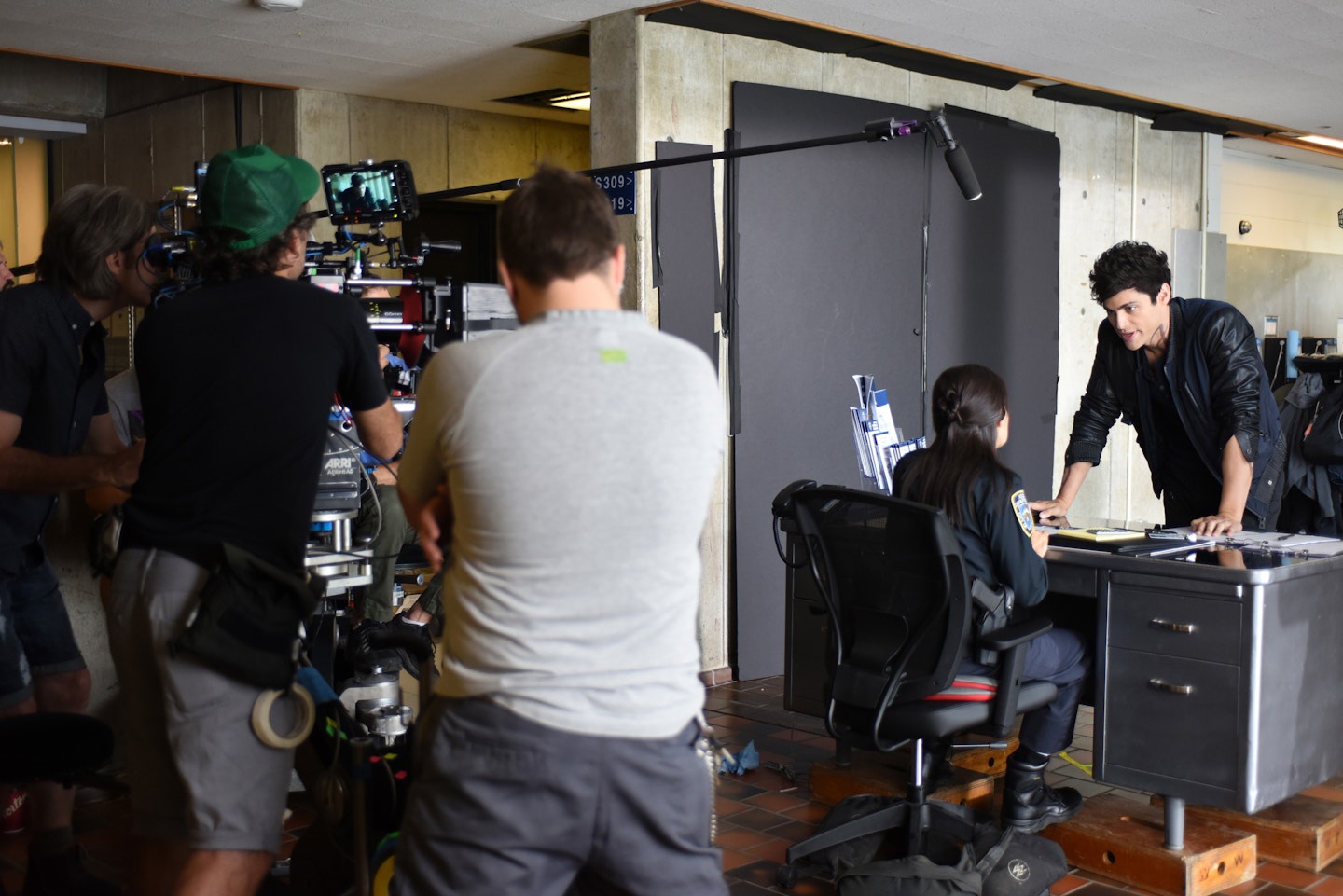
Marjorie David (co-executive producer): When Cassandra wrote the novels, she was developing the characters as she was in the process of writing, which is often the case with novels. But we had the whole tapestry of their lives from the beginning of the series to the end, so we were able to take things we knew about the characters in novel number five and pull them into novel number one. Since you're seeing characters in the show and you're with them all the time, it's something the audience needs to know. That's how we got to move it around and so far the fans have been pretty okay with it.
I've always had an affinity for stories that have a lot to do with transitioning into adulthood.
McG (executive producer/director): What drew me to this is that I love that period in life; I've always had an affinity for stories that have a lot to do with transitioning into adulthood. I saw that reflected in Shadowhunters; the opportunity to talk about that period where things have so much intensity and you're experiencing things so deeply and thoroughly, be it music or love or relationships of any sort. I really identify with stories that take place during that point of life as a primary point of entry. I brought that to Charlie's Angels, The O.C. and to a great many things that I've done. It just seems to be a place where I'm very comfortable. Plus I like the opportunity to tell stories of a secret world – whether it's comedic expression, as in Men In Black or something decidedly more serious. The idea of there's something out there that we don't even know about, but it's going on right in front of us, day and night. It's an exciting story platform. Those elements are what really brought me in to it.
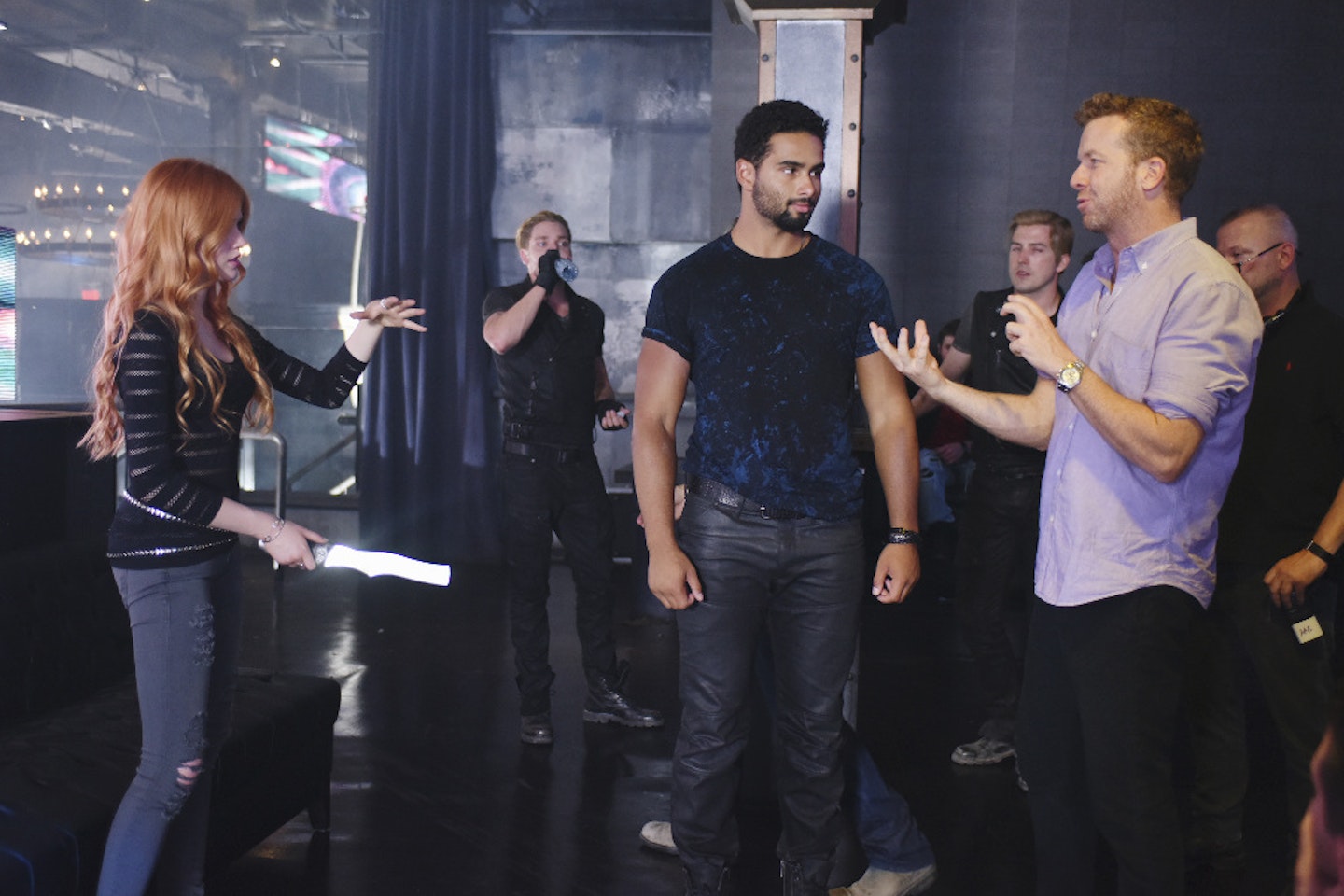
Among the series' cast members are Katherine McNamara, whose credits range from Broadway to guest starring roles on television and such features as Maze Runner: The Scorch Trials, as Clary Fray; Isaiah Mustafa, a former NFL practice squad wide receiver who is best known for his role in a series of Old Spice television commercials, as Detective Luke Garroway, who also happens to be a werewolf; Dominic Sherwood, a British model and actor who had a starring role in the big screen adaptation of Vampire Academy, as Shadowhunter Jace Wayland; Matthew Daddario, who counts among his film roles Delivery Man and When The Game Stands Tall, as Shadowhunter Alec Lightwood; and Harry Shum, Jr., known for Glee, Stomp The Yard, You Got Served and Crouching Tiger, Hidden Dragon: Sword of Destiny, as warlock Magnus Bane.
McG: The casting of this show is something that's very, very dear to me and I'm proud and pleased with what these actors are doing with these characters, and the way they're finding their voice and bringing it to life. I'm just exceptionally proud of them.
Katherine McNamara (actress, "Clary Fray"): I'd been looking for a role I could really grow into and this one really brought that. I'd read the script and I knew of the book series, and I fell in love with the world, the stories and these characters that are so three-dimensional and developed and flawed in so many ways. And who exist in this incredibly rich world.
McG: Katherine has the burden of being the lead of the show. She's obviously a very attractive, very dynamic actor, but here's what made me want to cast this young lady: She's brilliant, and she's intelligent, and I can't fabricate intelligence as a director. Either the actor has that intelligence and that verbal acuity and that skill set, or the actor does not. Katherine is just wise beyond her years. She has an extraordinarily active mind and she's very, very intelligent. What a huge asset that is to play with.
McNamara: One of the things I loved about working on Broadway was working with a cast of people mostly the same age for such a long period of time, playing the same character, really getting to know these people and having a home and a family at work. That's something that's so rare in this industry, because people are moving, constantly doing different things and recycling coworkers. It's nice to step back and have a home for a little bit and to really dig in deep with the same people and the same story; to dig into the nooks and crannies of the story and the character and see where it takes you. TV is such a fun medium, and it keeps you on your toes. There's no room for breaking, no room to stop and rest. It really makes you work hard and that's something I thrive on.
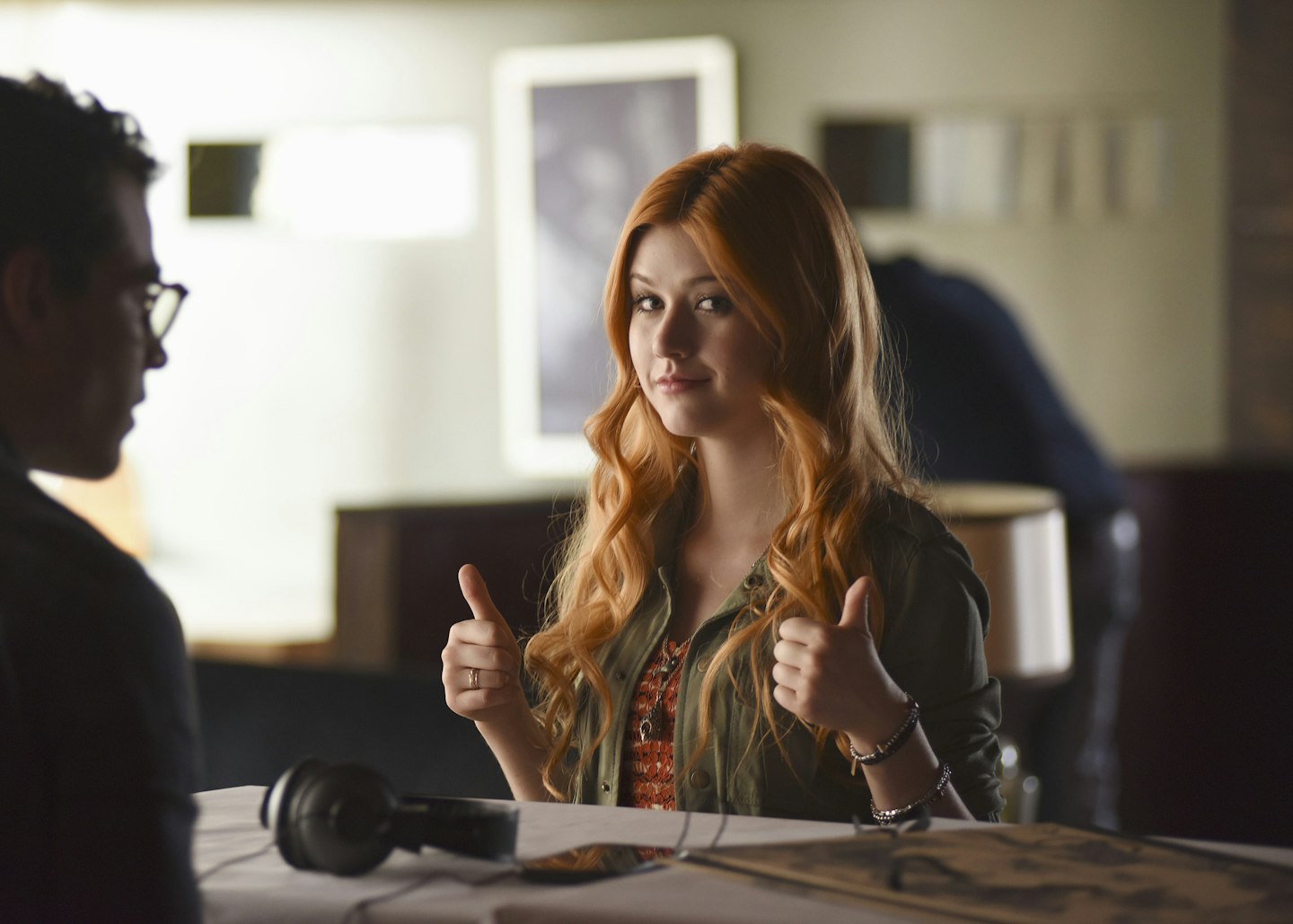
Isaiah Mustafa (actor, "Luke Garroway"): I wasn't familiar with the books – my daughter was all into them, so when I heard about it I just thought, "New York City detective; let me see what this is all about." And then when you go in there they ask if there are any questions. "Is this a normal detective story?" "Well, there's a little more to it than that. Your character is a werewolf, but he doesn't play a werewolf." With that in mind, after I got the job I figured I'd better read the books. In the end, I played Luke as a normal detective, a caring father figure to Clary and kind of moral compass of the show. He doesn't change much in season one; if he's going to evolve, it would be in season two. You get more of a sense of who he is as the season goes on. In season two you'll get a better sense of his personality and how he has an impact on the Shadow World.
Dominic Sherwood (actor, "Jace Wayland"): Generally, early in your career you can't be as picky with jobs, but I try very hard to only do things that make me happy, things that I would enjoy. Otherwise, why am I doing it? When I read the script, it was fun and it was funny, and there were great people attached. I liked the character, I liked the script, I liked the world. Plus McG was on to produce and direct the pilot, so it was a combination of everything that drew me in. Jace, to me, is kind of the living epitome of what a Yin and Yang is. He's the epitome of the good and bad and the good in the bad and the bad in the good. He's kind of in his world; a very talented soldier doing what he thinks is right, very often without the approval of his superiors. It's kind of complex, almost like a fantasy Jack Bauer.
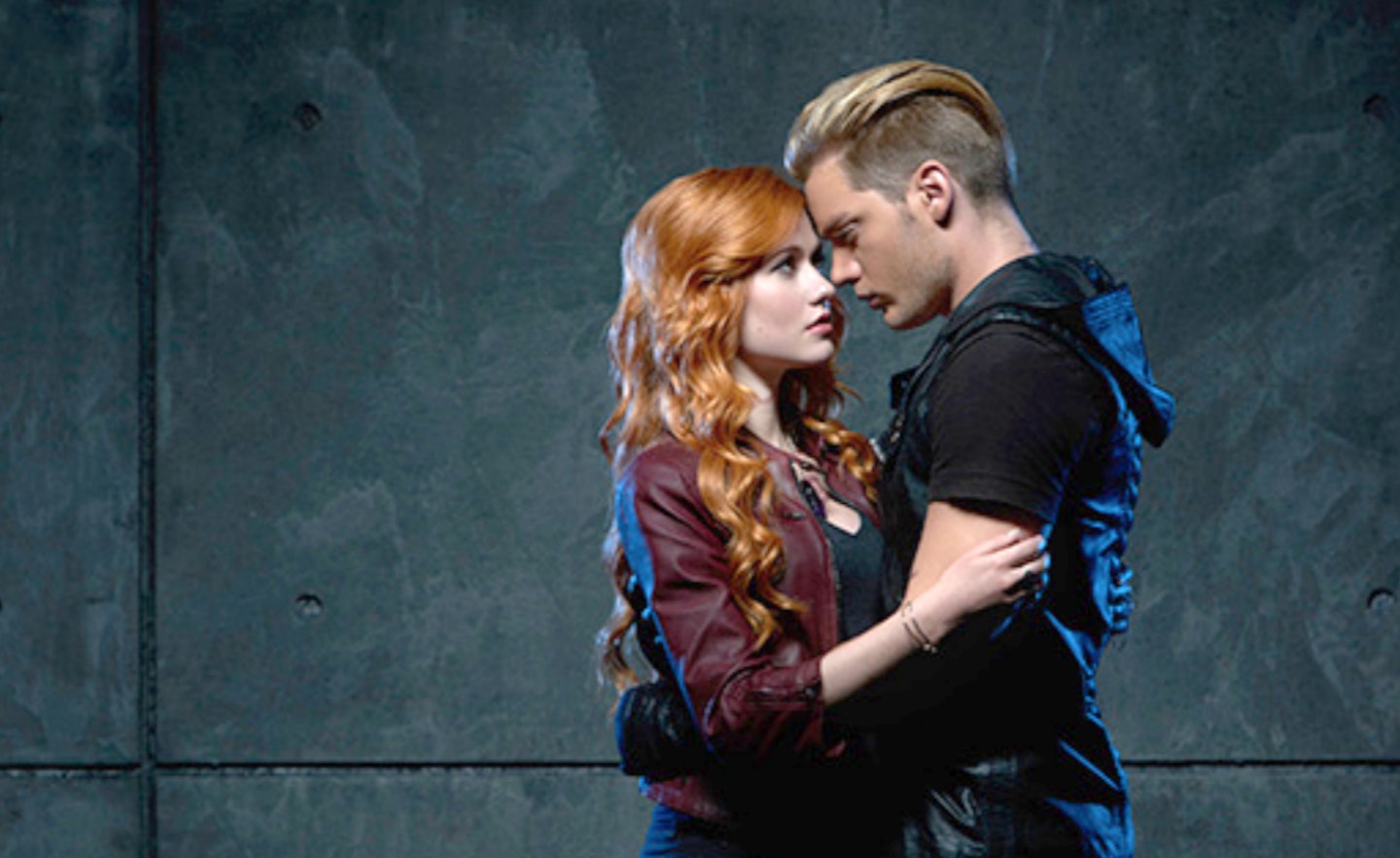
Matthew Daddario (actor, "Alec Lightwood"): When a part is offered to you, you have a couple of reactions. Initially you say, "Okay, I like work," and then obviously you have to either by force or not by force become interested in the material. Luckily in this case the material was very appealing to me. I find Alec to very vulnerable while in a position of power. He's hiding how he really feels from himself and obviously is a very flawed character - which is always interesting. He's young, but he gets to go through a kind of growth where he becomes an adult and a happy one at that. That struggle is very endearing and I relate to it. I'd say the season started with an emotionally stunted young man who is struggling with identity issues and issues of motivation and purpose. He feels a sense of duty, but that's not enough to drive somebody, you need to have things that are meaningful to you beyond what you've been told to do. Through the season he starts to realize that his understanding of who he is supposed to love changes, and he gets more in touch with himself. As a result, he comes to terms with who he is.
Harry Shum, Jr. (actor, "Magnus Bane"): I hadn't read the books before, although I had auditioned for the movie, so I didn't have a real sense of Magnus. I just knew him as this ancient warlock, but when you dig a little deeper it's more than that. He's the life of the party, he has a bit of reservation about the people he tries to help, and he's hedonistic. But there were just so many layers to him and the more I found out, the more interesting he became to me. Throughout the first season there's a lot of layers being stripped away and also him putting layers back on that were there. Talk about a guy who has been around for over 400 years – give or take a hundred, because he doesn't always tell the truth all the time. That's why you're constantly trying to figure him out, because one day he's flirting, one day he's pissed off and another day he's blasé about everything, because this guy has seen and gone through almost everything. At the same time, he has this very human aspect of these emotions that still get to him, that he can't completely throw away.

An integral aspect of the novels and something that is fully embraced in the series, is the growing relationship between Magnus and Alec (frequently conjoined as Malec). Unlike a lot of shows in the fantasy genre that might shy away from same sex relationships (Buffy notwithstanding, of course), Shadowhunters treats the duo pretty much the same way that any growing relationship would be treated. No trumpets heralding how progressive the show is, just a matter of fact approach.
Burke: It's something we encourage the writing staff to really lean into. We felt that was a big appeal of the source material. Everyone I asked about The Mortal Instruments said that the appeal was the romance. The relationships were a big driver of the interest underneath the science fiction and fantasy elements, so it felt important to keep that balance strong. We have a lot of relationship drama on our network - it's a staple of our programming - so it's nice to feel that this show fits in with those in terms of its core storytelling.
Shum: The show is all about the relationships; that's what really holds it all together. Whether "favoriting" – I'm talking in social media terms – a relationship or what they like to call "shipping," just putting a couple together, it's this world of connections at the end of the day. People just want to connect and see two people connect at the same time. I don't think the relationship between Magnus and Alec is as controversial as the media makes it. TV has gone a long way since even five years ago when it was weird to have a gay couple on TV, and now it's everywhere. The fact that it's on TV or film is really incredible. For me it feels normal, but then again I also live in LA, a place where it's everywhere. But for a kid in a small town that is not exposed to it in real life and only sees it on TV, that could be a little different.
Daddario: We took a lot of time to work on scenes with Magnus and Alec; we spent a lot of time reviewing those and trying to make sure they're being honest and we're not shoving something forward. There's no scene with the stereotypical, "Look at this!" It's handled really subtly and that's kind of nice, especially for this kind of relationship. This guy, Alec, is dealing with a variety of issues. Myriad problems from all these different angles – his siblings and this new person coming along and the various problems at his work. He's also got this guy who he's realizing he feels things for. And Magnus is no stranger to this. You kind of see how he appreciates Alec, because if he goes too aggressive, he knows he'll push him away, so Magnus has to handle this with great tact, which is difficult for him, because he's increasingly infatuated.
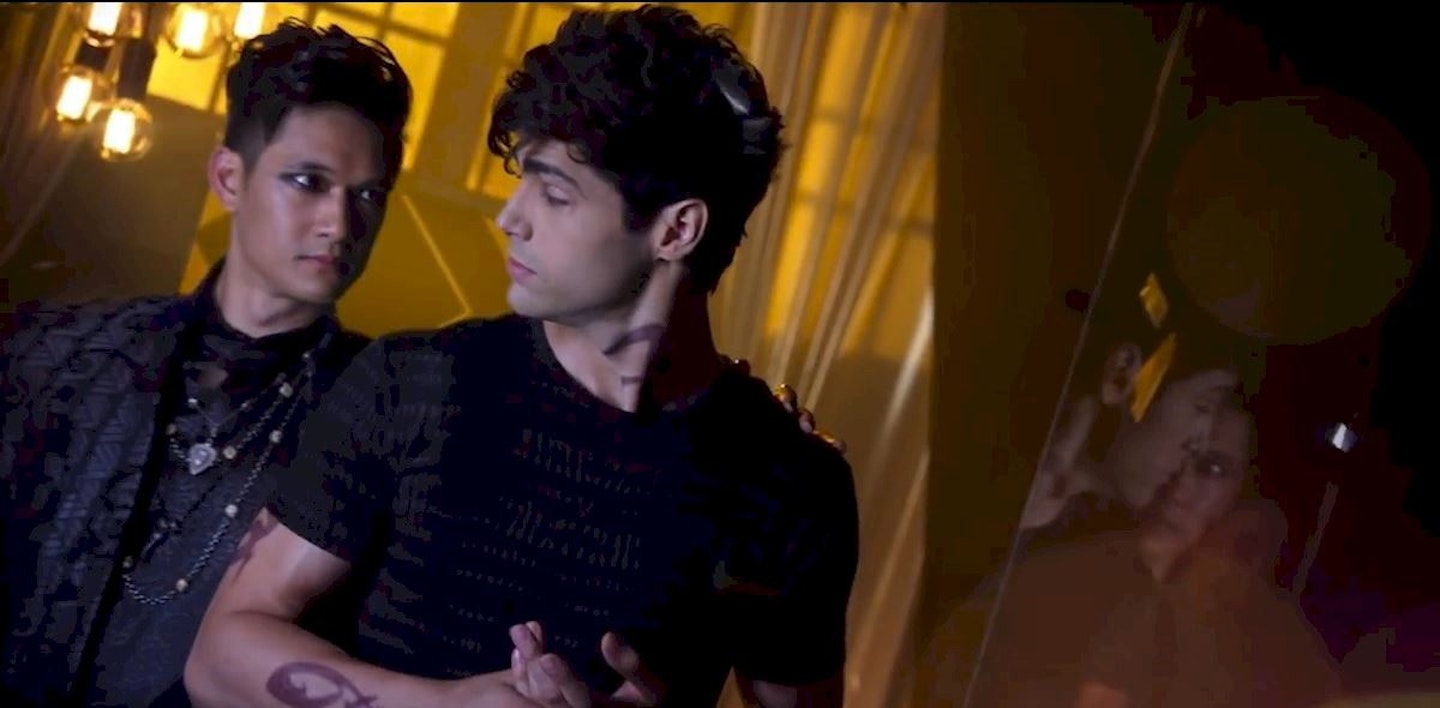
Decter: What I'm most proud of is it's two people who are attracted to each other and we don't comment that much on what gender they are. Maybe the community that they're in frowns upon it, but that's what I think is so refreshing about it: we're trying to treat it like it's any other love story. It just happens to be between two males.
Reisz: TV is now pushing the boundaries of what we can actually create conversations about with our audience. And the Shadowhunters, within a genre context, are able to do that in a way that I don't think has ever really been done all that often within this genre. We have a fan favorite storyline in Malec, and there have been a lot storylines that address relationships, but this is a really modern take on what it means to own who you are and what it means to truly fall in love and what it means to say, "This is how far I'm willing to go." And never once within that storyline – and it's something we're very dedicated to – has the network ever said, "You guys can't go there." They're, like, "Tell the story as deeply as you can."
David: The network encourages it, which we love them for, because it opens up so many doors. C'mon, we're dealing with a supernatural world – who cares what color anyone is or who loves who? We all know love has no gender, so we get to address issues which are addressed very directly in the books about Downworlders, which would be considered minorities. We can put these different faces on these Downworlders and talk about different issues of racism and sexism and prejudice against people's genders. We get to put on the face of a vampire or a werewolf or another creature, and that helps people see these things for what they are, because the characters that you're loving and relating to are every way and every sexual orientation. We love that, because we're building a world where it's just not an issue.
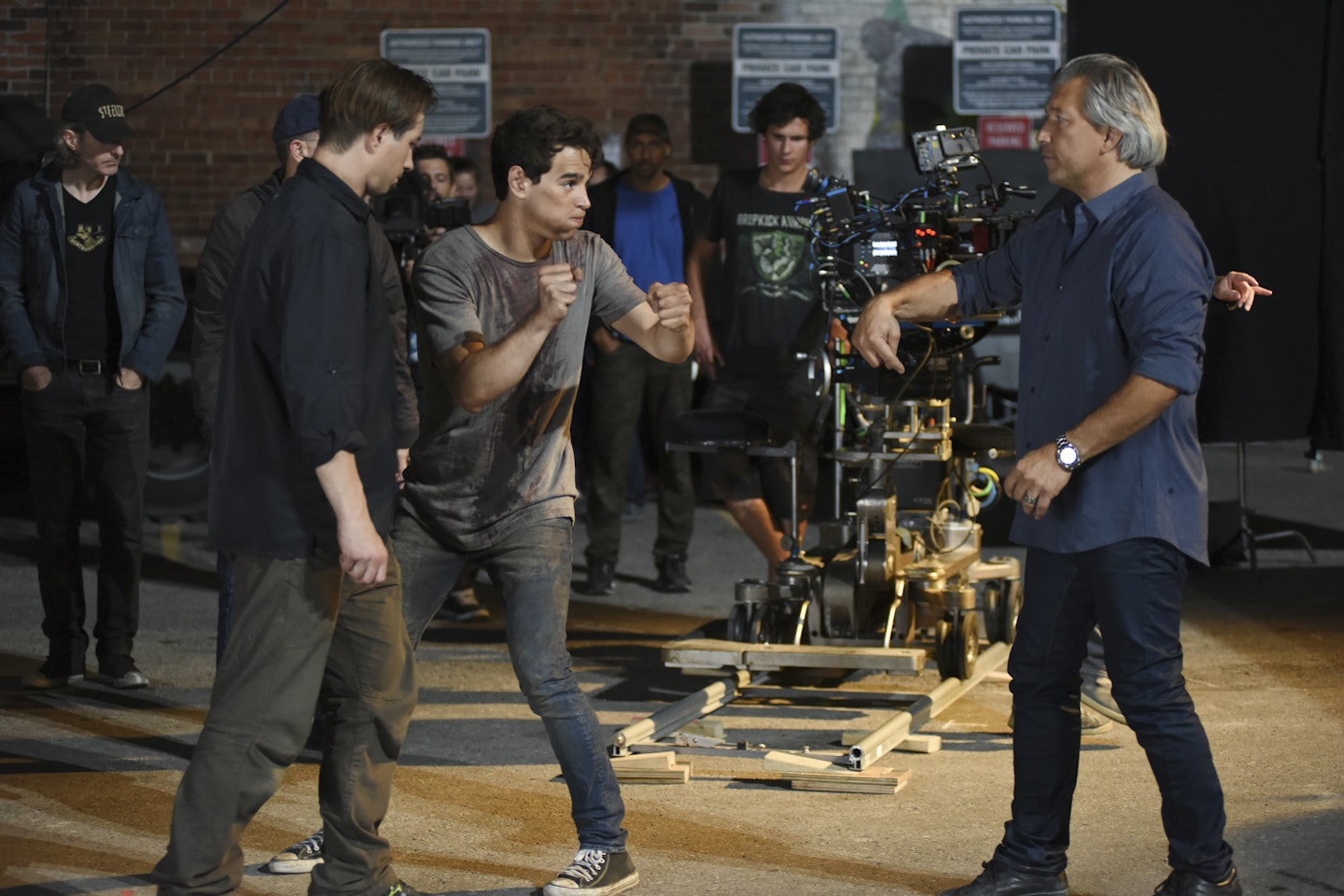
McNamara: What draws people to the show the most is the humanity of the characters. A lot of these characters are young people – I use the term people loosely – who are growing up, they're falling in love for the first time, they're figuring out who they are and what their place is in the world. That's relatable to a lot of people.
Reisz: I'm a huge Star Trek fan, all the way back to the original, and in that sci-fi fantasy genre you were able to tell true, relatable stories within this fantastical world. Amazingly with Clary and Cassandra and all the characters we're hopefully going to live with for a very long time, they get to do that as well in this world. It's our responsibility, because our audience is really smart, both the fans of the books as well as new fans of the series who are going to discover the books. We want to honor that. I always look at TV writing as a privilege to be able to go into peoples' homes and have a conversation with them. If they're going to give me an hour of their time, we've got to make it the best hour that we possibly can.
Shadowhunters is a fairly physical show, a point that allowed the cast to bond early on as they "enlisted" in a form of boot camp to get themselves ready for what was required of them.
McNamara: That was a huge part of our training process and our prep for the show, and also for our cast bonding. Not only did we have fitness training with a personal trainer who helped us eat right and get in shape and really look like the warrior that we wanted to become, we also had weapons training with swords and knives and whips and a myriad of demon killing devices we use on the show. Then we also did gymnastics training, because we wanted to do a lot of our own stunts. Our stunt coordinator put a lot of trust in us. Not only were we trying to find our way together, we're training together, we're working together. We became a family.
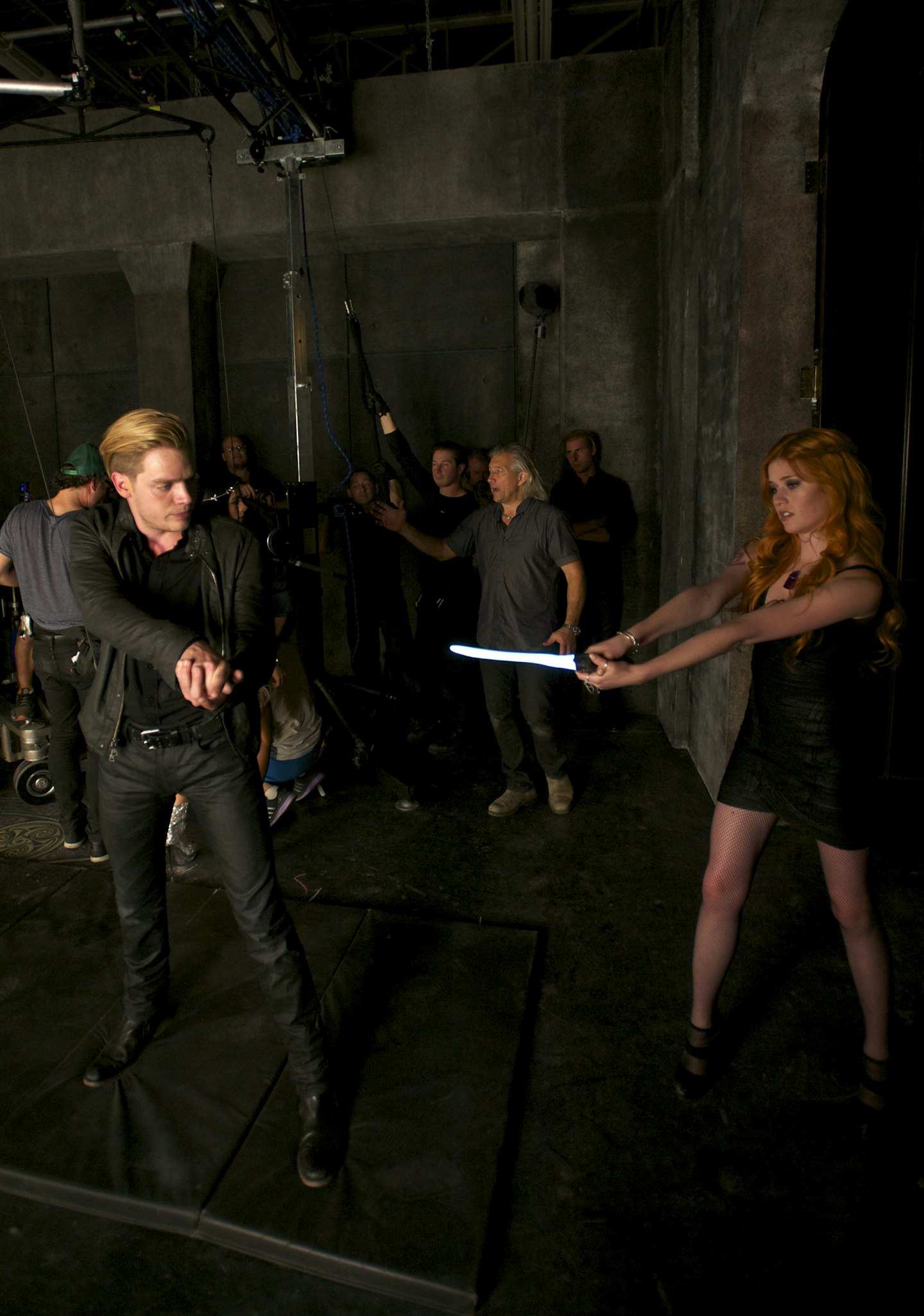
Daddario: There were a lot of things going on during boot camp. There was learning about this world, there was learning the characters, and then the working out and the eating and the meetings and all of that. Instead of getting tired, everyone handled it with great enthusiasm. I think everyone was so excited to be part of something with such scale and the working out was quite a thing. It was also a great way for all of us to be introduced to each other, and because of that kind of environment, where everyone is working towards a similar goal, it created these very strong friendships.
Sherwood: It was incredibly intense, especially for myself and Daddario and Alberto, who play Alec and Simon, because we had to completely transform our bodies into something that we weren't. I let myself go a little doughy – I think that's the best way of saying it – and we had to turn into these lifelong soldiers, because that's who they are. So we had to put on an incredible amount of muscle weight and maintain that through the show. Then, on top of that, learn how to use a sword and various martial arts so it looks like we've been doing it our entire lives. It was very intense, but it's really nice to work with such passionate and wonderful people, not only from the cast but also in the crew and our trainers and our stunt team. They're always working with us. It was actually really fun, rather than when you hear "boot camp" and think that it sounds horrendous.
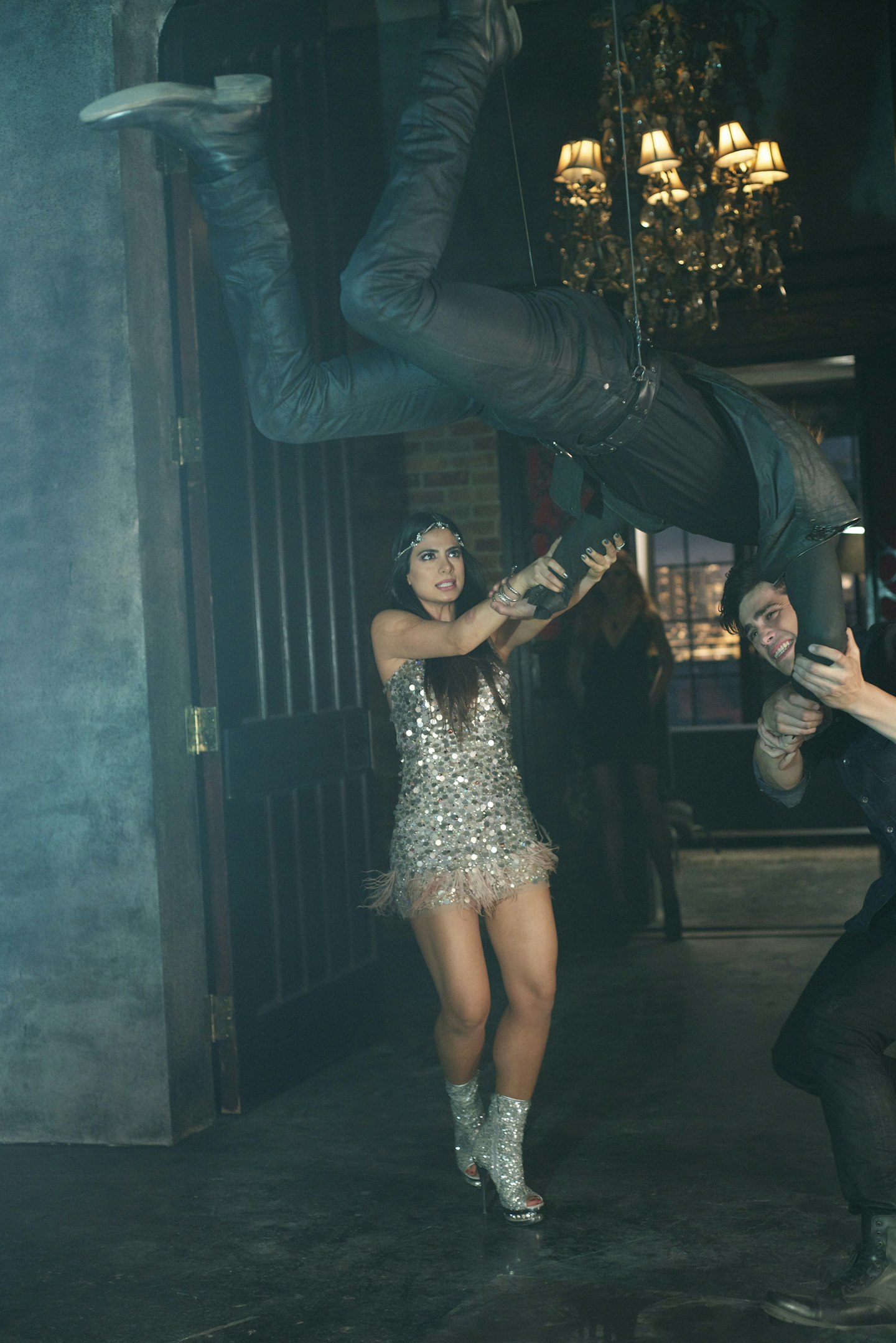
Visual effects play an important role in the show as well. Not long ago, producer Greg Berlanti – a creative driving force behind a plethora of superhero TV series, among them Supergirl, The Flash and Arrow – commented that always prominent on their mind is the fact that the audience can easily switch the channel from one of his shows to an Avengers or Superman film, and that to some degree they have to feel as though the visual experience isn't all that different – despite the difference of a couple of hundred million dollars.
McG: It's a challenge on a TV budget and a TV schedule, even though budgets and these schedules are getting better and better. But we all know that the collective expectation of television is certainly equal, if not more, than that of cinema itself. I'm old enough that I remember when that was certainly not the case. In the Game Of Thrones age, what is more resonant? Be it House Of Cards, be it Breaking Bad, take your pick. The Netflix shows, the Amazon shows, some of the network shows, the Berlanti shows. There's so much great stuff going on in television. It's the privilege of the viewer to say, "I expect it to hold up to what Zack Snyder is doing and what Chris Nolan's doing, and what everyone's doing." It's one of the wonderful privileges of being a fan and having the opportunity to choose what you're going to watch.
Decter: Greg Berlanti is absolutely right. His shows reflect an aspiration to look like top movies and that's what we're trying to do, but the way you have to think about it is that a movie can have twelve of those gigantic action sequences in an hour and a half, and we're lucky if we can have two. But our aspiration is for it to look film worthy. It's very easy to look at something and say that special effect looks a little cheesy, because we can't sit there like Michael Bay for two years working in the digital lab on Transformers. That makes that movie so awe-inspiring, because they have maybe a thousand people working on those scenes every moment.
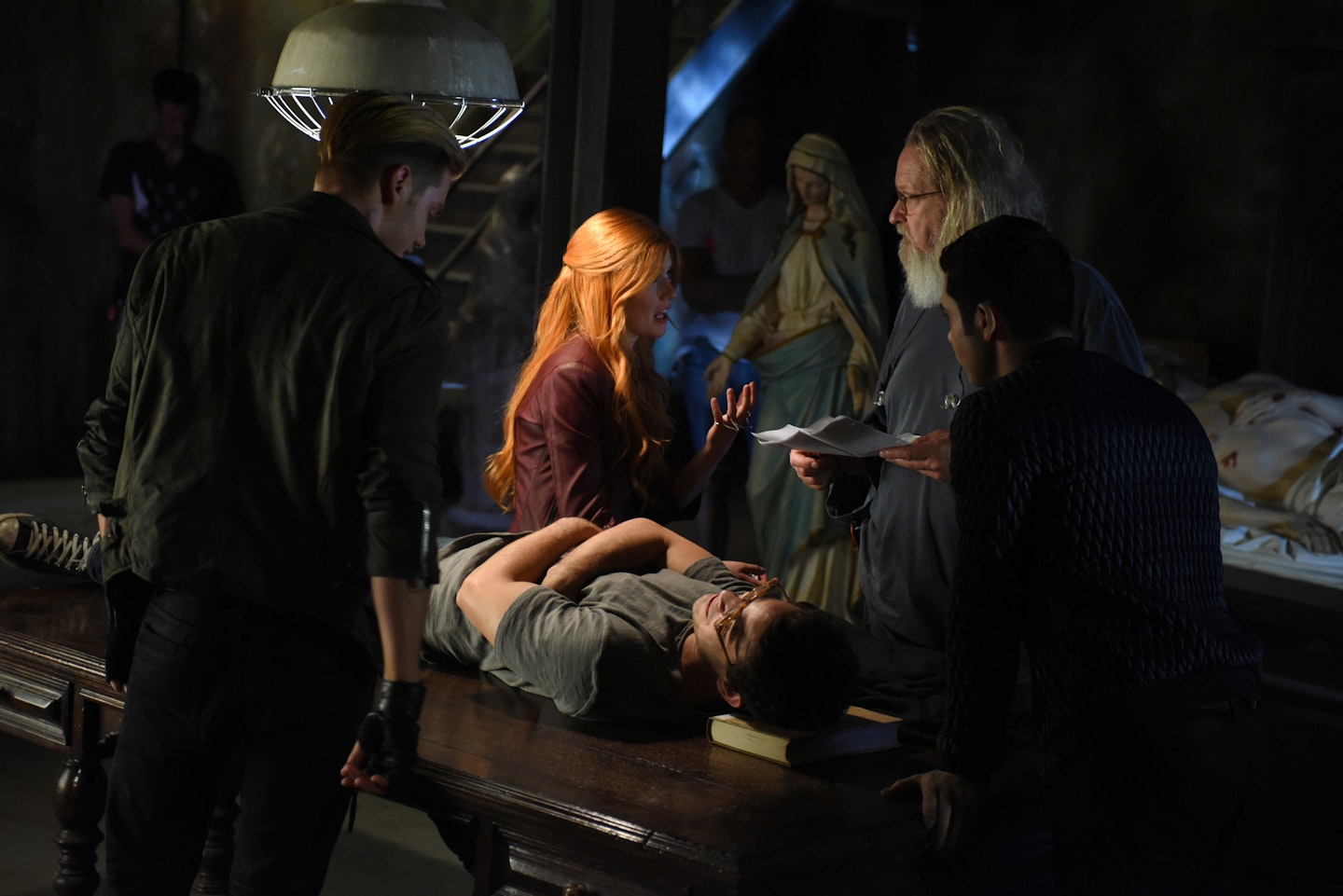
McG: Berlanti is a very dear friend of mine and the best thing that I take from our conversations is, what is the show in the absence of the super powers? How does the show work if you take them all away? that's a bar that you need to hold yourself against at all times as well. Naturally the best version is when the show works in a most stripped down capacity, in the absence of any visual effects whatsoever. In its place true storytelling. But when you incorporate inspired and new and inventive visual effects, wow! Now you're talking about my favorite movies. You're talking about my favorite TV shows.
Geoff Leavitt (visual effects supervisor): To make it work, it comes down to the collaboration between the different departments. Everybody has been very forthcoming; if they don't like something, they'll flat out say it. Working with McG on the pilot episode was a real eye-opener, because he was so charged with energy and you come in and you're having a good day, but then you sit down with him and by the time you leave you're having the best day ever – whether or he liked any of the effects or not. his enthusiasm was SO infectious. Ed Decter has the same approach. The thing is, Ed knows exactly what he wants, but if you show him something that he hadn't thought of, he'll say, "Wow, I like that even better!" So the fact that everyone on the show has been so open to new ideas has been incredible.
Decter: In the writers' room we sit there and draw out or animate anything we discuss. So if we say there's a Memory Demon that looks like it's made more of smoke and wind than demon form, we'll talk to the director and visual effects supervisor Geoff and say, "We came up with sort of a tornado looking thing with eyes in it," and then the director says, "Well, if it's going to look like that, I'm going to put the actors in a circle....," and as we go along we're refining things. Then we have to get the look of this approved by the network, so we'll send them artwork and they'll go, "Yeah, that looks kind of scary," and then we develop it further. The joke is that on the page you say "3,000 Spartans come over the hill," and then someone is going to sit down and draw all those Spartans on the computer. Well, we have a similar process. We don't censor ourselves when we say this. Then, as we go along the director and line producer and production designer will say, "Which one of these two gigantic sequences are we keeping, because there's no way we can do both? And is there a way to make the first one a little simpler?" And that's what we did.
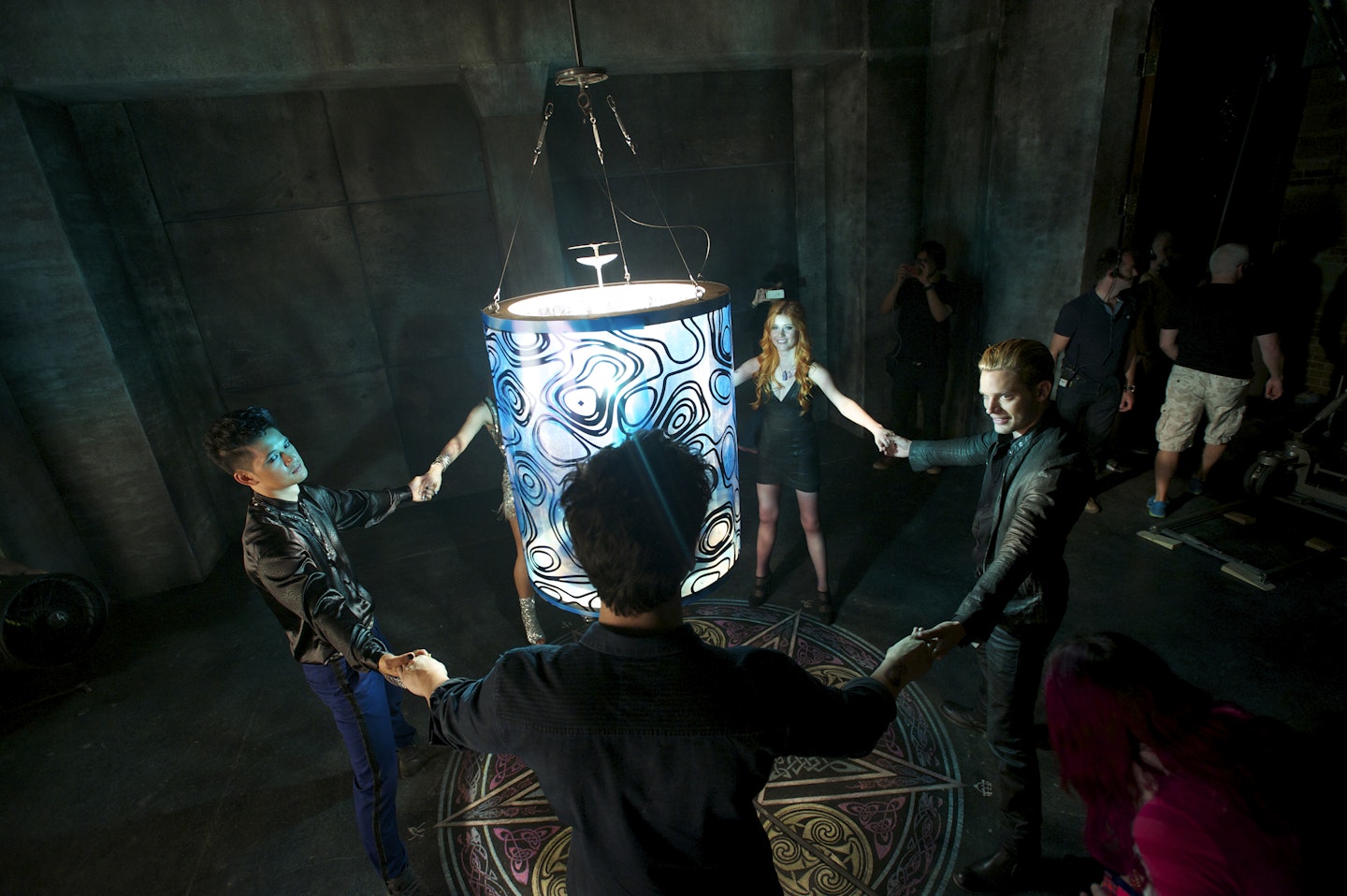
Leavitt: We worked long and hard on the Memory Demon sequence, and from where it started out to where it ended up, there's a world of difference. We get these descriptions on paper in our scripts, and so now it's, like, we have this giant swirling demon. What is it? Is it water? Is it smoke? Where are we going to take it? We do a lot of research and development on these creatures. We try to figure out what's going to end up looking good versus something that looks cheesy or too hokey. Then once we have some ideas, we go ahead and throw them in front of the producers and in front of the network and say this is what we're thinking, let us know how it's working. A lot of times we have to say, "Use your imagination, because in order to accomplish this feat we're going to have to run through a lot of iterations and those iterations aren't going to be fully realized, but this is where we're going with it."
Daddario: The Memory Demon was a cool experience to shoot. When we're filming, obviously there's a practical effect they had going on, but to do the lighting and everything - somebody constructed this spinning tube with cellophane around it with holes cut in it. It was blue. And they had fans underneath it, so they had it spinning and running the fans and you stand there looking it and think, "I can sort of visualize what's going on," and then when they put in the effects, it was very impressive to see that it actually worked.
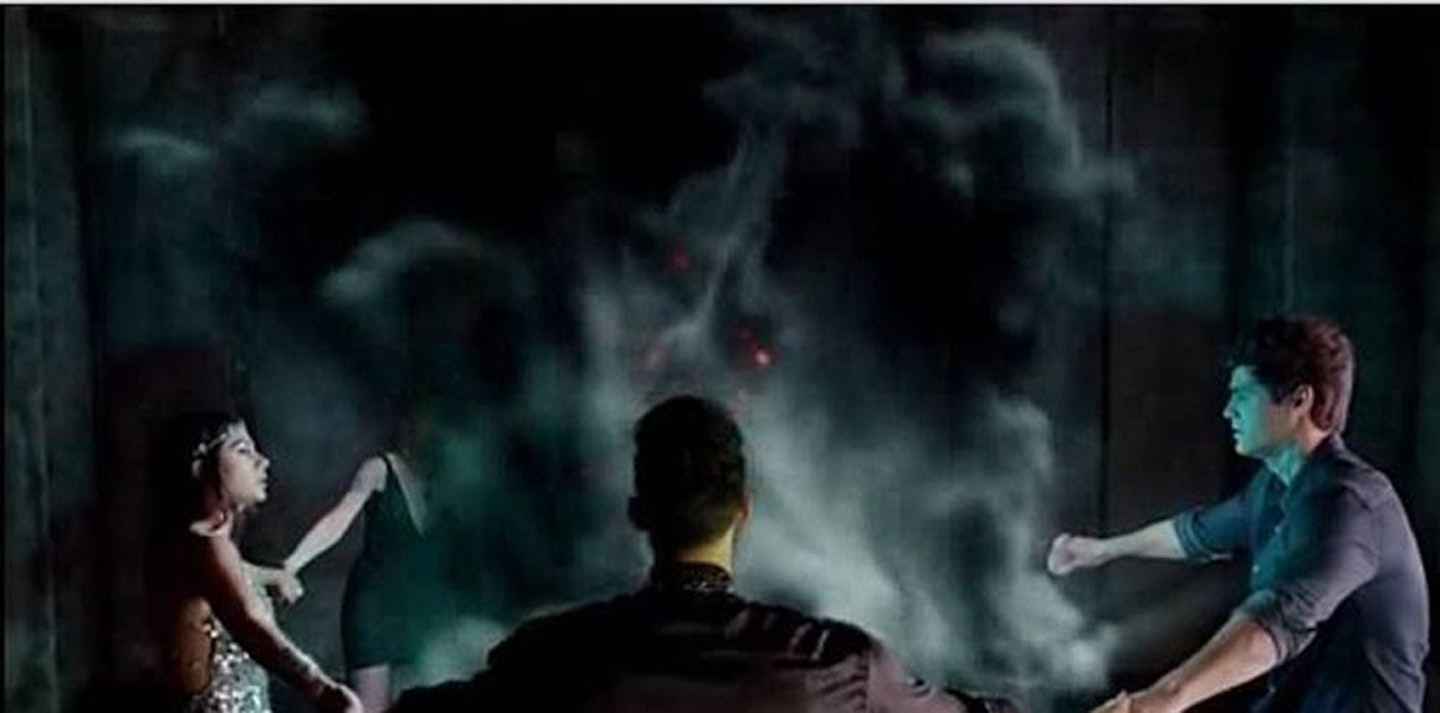
Sherwood: On paper, the Memory Demon wasn't actually a demon; it wasn't a creature. It was a tornado, which none of us really expected, even though it was described in the script. We were expecting kind of a humanoid-esque creature and that's not what it was, so it was new and interesting and cool. It's also interesting to film stuff like that as well, because we obviously don't have a tornado there. We have kind of a spinning blue gel with a light inside it and a fan. That was our Memory Demon on the set, so that's kind of the real pulling your acting talent out of your ass, because you have to pretend that it's actually there.
Shadowhunters as a series is a show that has consistently improved as it's gone on throughout its first season, and gives every indication that it could "pop" in its second year. Some media pundits have even offered up the feeling that with a bit of honing, it has the potential to be this generation's Buffy The Vampire Slayer, particularly with a strong, evolving female character at its center.
McG: Buffy is the North Star for all of us. You're talking about a writer – Joss Whedon – at the peak of his prowess, who has obviously gone on to do great things since, of course. What a great tonal exploration that proved to be. We have some fun with Supernatural in that regard. I do think the idea of having a supernatural sword to wield in your bag of tricks as a storyteller can just be one more way to get that story across and do so in a more entertaining fashion. Buffy being the finest example. I think a lot of shows are great in season one, but a lot pop even more when they really discover what they are and what they are not and iron out some of those wrinkles. We have such a wealth of material in the existing books and stories and lore and what have you. That's just part of wrangling this big, giant storytelling platform. Obviously you see what's going on with Game Of Thrones, they're doing it at a very high level. We would hope to have the same luck. I'm pleased with the natural progression of the show finding its sea legs and finding its true voice. But there are technical things I want to improve. The visual effects will continue to improve. The nuance of the character dynamics will continue to improve, because I have that wonderful feeling in my gut that this thing could be special and really break out and make a difference in season two and beyond. I want to make sure that we lay the platforms and are supportive of that happening.
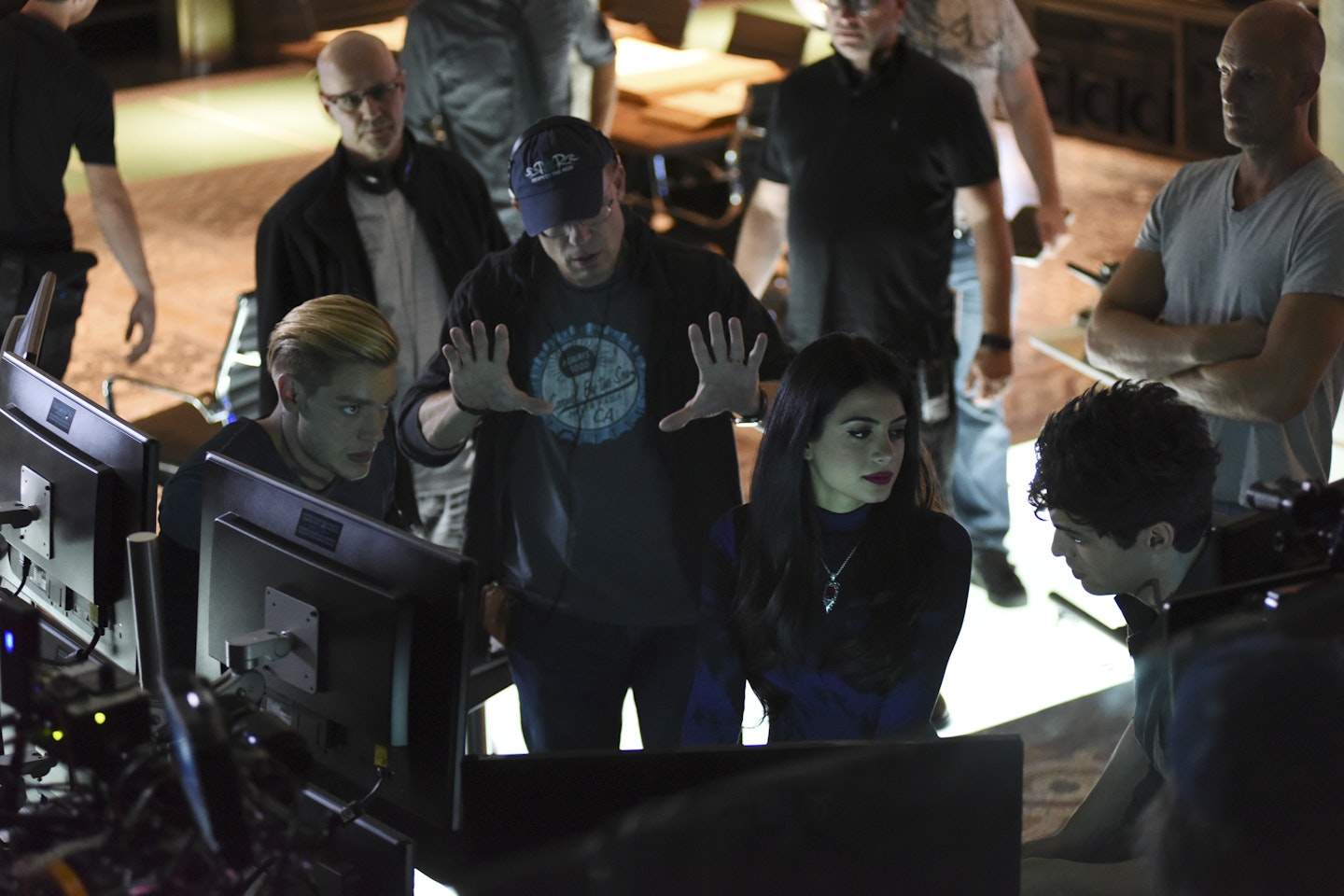
David: Buffy was the beginning of shows where the supernatural world was a metaphor for our world in a very direct way. We were all aware of that right from the beginning and we were all aware of the spunky young woman and heroine and her friends. You just can't get away from that. So we tip our hats and acknowledge it and thank everyone who was ever involved with it.
Buffy was the North Star for all of us.
Decter: I'm sorry, but that's too much pressure in the sense that Buffy was phenomenal. Joss and I went to the same college, we know each other, so we don't desire to copy Joss at all. It's in a genre that is similar, but Buffy had a really snappy topical sense of humor which is uniquely Buffy. Our world is a little bit darker, although we still try to have a good sense of humor. But Buffy is a standout – it's really the bar that everyone aspires to.
Mustafa: Shadowhunters, I feel, represents a steady evolution. From the pilot you get a sense of what's going on, and the production was really good about creating a world for us to play it. As it goes along, this world opens up and you get more personality and you get a better sense of where these characters come from, where they possibly could be going, who else is in their world, the world they live in... You start to get a better sense of how big the world is. So it's evolving, but with any show, the first season you're finding your legs and as that happens, you can move on from there. I'd like to think with season two it's just going to get crazier in a good way.
Sherwood: Jace ends up a completely different person at the end of season one. He goes through this huge arc and learns about himself and his past. And the basis of who he is and what made him who he is gets completely turned on its head. But every character in our show goes through this tremendous arc and changes and evolves and learns new things about themselves and discovers new abilities and talents and parts of themselves that they had no idea existed. So as an actor, that's incredibly satisfying, because every day, with every new script, I'm constantly challenged and pushed in a different direction.
McNamara: Clary becomes a warrior by the end of the second book, so we have to take care that she progresses on her journey, but doesn't get there too quickly. She finds in the Shadow World that inner strength amplified; she's forced to have it amplified to a level she never thought she would need to, never even knew she had in her. And what's so great about the series is there's this ebb and flow of strength and vulnerability - every time she thinks she's landed on her feet and she thinks she knows what's going on and she's ready to kick some ass, the rug gets pulled out from under her again and she's off her game. And she's forced to take a few steps back and rise from the ashes once again. It's a battle the whole season of one step forward, two steps back.

Decter: In the first season, Clary has a phenomenal arc. It's written in the book beautifully, where she goes from someone who doesn't know her identity and what she's capable of, and then becomes aware of who she is and why she felt different all these years. Then she becomes a Shadowhunter and embraces her new life, becoming a leader of a new type within the very old Shadowhunter traditions.
McNamara: By the end of the first season, we've barely scratched the tip of the iceberg of the warrior she's going to become, but she definitely has grown a lot. That growth comes from not really playing on the supernatural aspects, but on her humanity. She's dropped into this world she knows absolutely nothing about, and into the middle of what is really a war between good and evil, and she's forced to make these choices. She makes mistakes, she makes sacrifices on her own, and she costs people things she didn't intend. And through the course of the season, she really has to grow up and learn how to ask forgiveness and to forgive herself, and learn how to make mistakes and deal with the consequences.
Shadowhunters airs on Freeform in the US and on Netflix in the UK.
